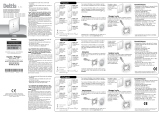SCS Sentinel 3513143550112 El manual del propietario
- Tipo
- El manual del propietario

DELTIS 2.61
2.62 - 2.63
Micromodules émetteurs radio DELTIS
Micromódulos radio emisores DELTIS
Micro módulos emissores de rádio DELTIS
SenderUnterputzmodule DELTIS
Mikro nadajniki sterujace DELTIS
Micromodule radio transmitter DELTIS
3V lithium
CR2032
3V lithium
CR2032
Replacing
the battery
Location / Mounting
The transmitters must be set up behind the existing element, at
the back of the flush-mounted box.
After connecting the transmitter to the switch, position it at the
back of the flush-mounted box before attaching the switch.
Be careful that the wires do not become trapped.
Fitting
the batteries
• Lea atentamente estas instrucciones antes de la
instalación.
• El aparato se debe instalar conforme a las normas
en vigor.
• Antes de cualquier intervención, corte la co-rriente.
• No intente reparar este aparato, existe un Servicio
Postventa a su disposición.
• Por motivos de claridad, sólo debe tenerse
en cuenta el principio de los esquemas. En éstos
no figuran las protecciones y otros accesorios exi-
gidos por las normas. Se debe respetar la norma
UTE NF C15-100 y las reglas del oficio. Es nece-
sario que los aparatos conectados o cercanos no
creen perturbaciones demasiado fuertes (directi-
vas 2004/108/CE).
• Lees deze handleiding voor het aansluiten aan-
dachtig door.
• U dient het apparaat volgens de geldende nor-
men te installeren.
• Schakel voor elke ingreep de stroom uit.
• Probeer dit apparaat niet zelf te repareren; de
klantenservice is u graag van dienst.
• Omwille van de duidelijkheid, dient u de gegeven
aanwijzingen in beginsel te respecteren. De
beveiligingen en andere accessoires die door de
normen vereist zijn, staan niet op de tekeningen.
De norm en de aanwijzingen moeten strict nage-
leefd worden. De aangesloten of aangrenzende
toestellen mogen geen al te grote storingen
veroorzaken (richtlijnen 2004/108/CE).
• Ler atentamente este folheto antes de qualquer
instalação.
• O aparelho deve ser instalado de acordo com as
normas em vigor.
• Antes de qualquer intervenção, por favor corte a
corrente.
• Não tentar reparar este aparelho, tem à sua
disposição um serviço de após venda.
• Para maior clareza, os esquemas realizados
são para reter no início. Não figuram protecções
e outros acessórios exigidos pelas normas. A
norma e as boas práticas devem ser respeitadas.
É necessário que os aparelhos ligados ou cir-
cundantes não criem perturbações muito fortes
(directivas CEE 2004/108/CE).
• Przed przystąpieniem do montażu należy
uważnie przeczytać tę instrukcję.
• Urządzenie powinno być zamontowane zgodnie
z obowiązującymi normami.
• Przed przystąpieniem do prac należy odłączyć
dopływ prądu.
• Nie naprawiać samodzielnie tego urządzenia.
Należy skorzystać z usług serwisu
posprzedażowego.
• Z obawy o przejrzystość zamieszczone sche-
maty zawierają tylko podstawowe informacje.
Nie naniesiono na nich zabezpieczeń i innych
akcesoriów wymaganych przez normy. Należy
przestrzegać norm i zasad sztuki. Urządzenia
podłączone lub znajdujące się w pobliżu nie
mogą być źródłem zbyt dużych zakłóceń
(dyrektywy 2004/108/CE).
• Carefully read these instructions prior to installation.
• The unit must be installed in compliance with
currently applicable standards.
• Always switch off the mains before installing or
servicing the unit.
• Do not attempt to repair the unit yourself; an
after-sales service is available.
• The diagrams provided are simplified for greater
clarity. The protective units and other accessories
required by the standards are not illustrated.
Standards and good practice must be complied
with.
Connected or nearby equipment must not
generate excessive interference (directive
2004/108/CE).
• Lire attentivement cette notice avant toute
installation.
• L’appareil doit être installé selon les normes en
vigueur.
• Avant toute intervention, veuillez couper le cou-
rant.
• Ne pas essayer de réparer cet appareil
vous-même, un service après-vente est à votre
disposition.
• Par souci de clarté, les schémas réalisés sont
à retenir dans leur principe. N'y figurent pas les
protections et autres accessoires exigés par les
normes. La norme UTE NF C15-100 et les
règles de l'art doivent être respectées.
Il est nécessaire que les appareils connectés
ou environnants ne créent pas de perturbations
trop fortes (directives 2004/108/CE).
Français
Cette notice est commune aux micromodules émetteurs DELTIS :
DELTIS 2.61 : Commande 2 voies ON/OFF pour interrupteur double va-et-vient
DELTIS 2.62 : Commande 2 voies ON/OFF pour interrupteur double-poussoir
DELTIS 2.63 : Commande 1 voie montée/descente pour interrupteur volets roulants
Español
Este manual es común a todos los micromódulos emisores DELTIS:
DELTIS 261: Mando sobre 2 vías ON/OFF para interruptor doble conmutado
DELTIS 262: Mando sobre 2 vías ON/OFF para interruptor doble pulsador
DELTIS 263: Mando sobre 1 vía subida/bajada para interruptor de persiana
motorizada
Litio 3V
CR2032
Litio 3V
CR2032
Cambiar la pila
Emplazamiento / Fijación
Los emisores se instalan detrás de un mecanismo existente en
el fondo del cajetín de mando eléctrico . Después de conectar
los cables del emisor a los del interruptor, posiciónelo en el fondo
del cajetín de mando eléctrico antes de fijar el interruptor. Tenga
cuidado de no pinzar los cables.
Colocar la pila
Lithium 3V
CR2032
Lithium 3V
CR2032
Changer la pile
Emplacement / Fixation
Les émetteurs s’installent derrière un appareillage existant, dans
le fond de la boîte d’encastrement (boîte > 40 mm).
Après avoir raccordé l’émetteur à l’interrupteur, positionnez-le au
fond de la boîte d’encastrement avant de fixer l’interrupteur.
Attention à ne pas coincer les fils.
Mettre en
place la pile
Nederlands
Deze handleiding is op de volgende micromodule zenders DELTIS van toepassing:
DELTIS 2.61: Aansturing van 2 AAN/UIT kanalen voor dubbele wisselschakelaar
DELTIS 2.62: Aansturing van 2 AAN/UIT kanalen voor dubbele drukschakelaar
DELTIS 2.63: Aansturing van 1 schakelaar voor bediening rolluik
Portuguès
Este manual é comum aos micro módulos emissores DELTIS:
DELTIS 2.61: Comanda 2 vias ON/OFF para interruptor duplo vaivém
DELTIS 2.62: Comanda 2 vias ON/OFF para interruptor dupla pressão
DELTIS 2.63: Comanda 1 via subida/descida para interruptor borboletas rolantes
Lítio 3V
CR2032
Lítio 3V
CR2032
Mudar a pilha
Localização/Fixação
Os emissores instalam-se na parte de trás de um aparelho
existente, no fundo da caixa de encastramento. Após ter ligado o
emissor ao interruptor, posicione-o no fundo da caixa de
encastramento antes de fixar o interruptor. Atenção para não
bloquear os fios.
Colocar a
pilha no lugar
Lithium 3V
CR2032
Lithium 3V
CR2032
De batterij
vervangen
Plaatsing/Montage
De zenders worden achter bestaande schakelapparatuur
ingebouwd, achter in de inbouwdoos. Nadat u de zender op de
schakelaar aangesloten heeft, plaats hem achter in de
inbouwdoos. Let erop dat de draden niet klem komen te zitten.
De batterij
plaatsen
Polski
Instrukcja ta dotyczy następujących mikromodułów nadawczych DELTIS:
DELTIS 2.61: Sterowanie 2 kanałami ON/OFF dla podwójnego wyłącznika wahadłowego
DELTIS 2.62: Sterowanie 2 kanałami ON/OFF dla podwójnego wyłącznika przyciskowego
DELTIS 2.63: Sterowanie 1 kanałem podnoszenia/opuszczania dla wyłącznika rolet
zewnętrznych
Litowa 3V
CR2032
Litowa 3V
CR2032
Wymiana
baterii
Umiejscowienie / Mocowanie
Nadajniki należy zainstalować za urządzeniem, w puszce
montażowej. Po połączeniu nadajnika z wyłącznikiem należy
umieścić go w puszce montażowej zanim zostanie zamocowany
wyłącznik. Należy uważać, by nie klinować przewodów..
Umieścić
baterię
English
These instructions apply to the following micromodule transmitters DELTIS:
DELTIS 2.61: 2 ON/OFF channel control for a two-way switch.
DELTIS 2.62: 2 ON/OFF channel control for a double push-button switch.
DELTIS 2.63: 1 up/down channel control for a roller blind switch.
*2701750_Rev.1*
France :
DELTA DORE
Bonnemain - 35270 COMBOURG
España :
DELTA DORE, S.A
C/ Antonio Borja, 13 local 1 y 2
08191 Rubí (Barcelona) ESPAÑA
Servicio técnico
Tlf. 902 12 13 15
www.deltadore.fr

21
Vert / Verde / Verde
Groen / Zielony / Green
Jaune / Amarillo / Amarelo
Geel / Żółty / Yellow
Blanc / Blanco / Branco
Wit / Biały / White
C
1
2
1
C
2
DELTIS
2.61
BP 2BP 1
Vert / Verde / Verde
Groen / Zielony / Green
Jaune / Amarillo / Amarelo
Geel / Żółty / Yellow
Blanc / Blanco / Branco
Wit / Biały / White
C
1
2
1
C
2
DELTIS
2.62
Vert / Verde / Verde
Groen / Zielony / Green
Jaune / Amarillo / Amarelo
Geel / Żółty / Yellow
Blanc / Blanco / Branco
Wit / Biały / White
C
1
2
1
C
2
DELTIS
2.63
1 2 3 4
Français
Raccordement
Commande 2 voies ON/OFF avec un
interrupteur double va-et-vient.
Commande 2 voies ON/OFF avec un
interrupteur double poussoir.
Commande montée/descente avec un
interrupteur volet roulant.
Association radio
Mettez le(s) récepteur(s) en mode
association (voir notice du récepteur).
Pour les émetteurs DELTIS 2.61 et 2.62,
appuyez 5 secondes sur la touche de la
voie à associer (1 ou 2).
Pour l’émetteur DELTIS 2.63,
appuyez simultanément 5 secondes sur les
2 touches de l’émetteur.
Dans le cas d’un micromodule récepteur
DELTIS, l’élément commandé s’actionne
brièvement.
Pour un autre récepteur, son voyant cesse
de clignoter.
L’émetteur est associé au(x) récepteur(s).
Caractéristiques techniques
• Alimentation 1 pile Lithium 3V, type
CR2032 (autonomie d’environ 5 ans)
• Isolement classe III
• Fréquence d’émission : 868 MHz, classe 1
(Norme EN 300 220), protocole X2D
• Dispositif de télécommande radio
• Portée radio de 100 à 300 mètres en
champ libre, variable selon les équipe-
ments associés (portée pouvant être
altérée en fonction des conditions
d'installation et de l'environnement
électromagnétique)
• Température de fonctionnement :
0 à +40°C
• Température de stockage : -10 à +70°C
• Dimensions : 40 x 40 x 10mm
• Installation en milieu normalement pollué
4
1
2
3
Appareil conforme aux exigences des directives :
R&TTE 1999/5/CE (radio)
En raison de l’évolution des normes et du matériel, les caractéristiques
indiquées par le texte et les images de ce document ne nous engagent
qu’après confirmation par nos services
Español
Conexión
Mando sobre 2 vías ON/OFF para
interruptor doble conmutado.
Mando sobre 2 vías ON/OFF para
interruptor doble pulsador.
Mando sobre 1 vía subida/bajada para
interruptor de persiana motorizada.
Asociación radio
Ponga el (los) receptor(es) en modo asociación
(ver las instrucciones del receptor).
Para los emisores DELTIS 2.61 y 2.62, pulse
durante 5 segundos el botón de la vía a
asociar (1 o 2).
Para el emisor DELTIS 2.63, pulse
simultáneamente durante 5 segundos los dos
botones del emisor.
En el caso de un micromódulo receptor
DELTIS, el elemento mandado se pone en
marcha brevemente y se para.
Si se trata de otro tipo de receptor, su testigo
deja de parpadear.
El emisor está asociado al (los) receptor (es).
Características técnicas
• Alimentación mediante 1 pila de litio 3V, de
tipo CR2032 (aproximadamente 5 años de
autonomía)
• Aislamiento de clase III
• Radiofrecuencia: 868 MHz, clase I
(Norma EN 300 220), protocolo X2D
• Dispositivo de radio control remoto
• Alcance radio de 100 a 300 metros en campo
libre según los equipos asociados (el alcance
puede verse alterado en función de las condi-
ciones de la instalación y del entorno electro-
magnético )
• Temperatura de funcionamiento: 0° C a +40° C
• Temperatura de almacenamiento: -10 a +70° C
• Dimensiones: 40 x 40 x 10mm
• Instalación en un medio de contaminación
normal.
4
1
2
3
Producto conforme a las exigencias de las directivas :
R&TTE 1999/5/CE (radio)
Debido a la evolución de las normas y del material, las características
indicadas en el texto y las imágenes de este documento sólo nos
comprometen después de haber sido confirmados por nuestros servicios.
Nederlands
Aansluiting
Aansturing van 2 AAN/UIT kanalen met
een dubbele wisselschakelaar.
Aansturing van 2 AAN/UIT kanalen met
dubbele drukschakelaar.
Bediening van schakelaar voor het openen
en neerlaten van rolluik.
Aansluiting zender
Zet de ontvanger(s) in de verbindingsstand (zie
hiervoor de handleiding van de ontvanger).
Voor de DELTIS 2.61 en 2.62 houdt u de knop
van het te verbinden kanaal (1 of 2) 5 seconden
lang ingedrukt.
Voor de DELTIS 2.63 drukt u beide knoppen
van de zender gelijktijdig gedurende 5 seconden
in.
In geval van een micromodule ontvanger
DELTIS, wordt het aangestuurde apparaat kort
in werking gesteld en vervolgens weer
uitgeschakeld.
In geval van een andere ontvanger, stopt het
lampje met knipperen.
De zender is aangesloten op de ontvanger(s).
Technische gegevens
• Voeding: Lithium 3V batterij, type CR2032
(levensduur ongeveer 5 jaar)
• Klasse III isolatie
• Zendfrequentie: 868 MHz, klasse I
(EN 300 22o Norm), protocol X2D
• Radiogestuurde afstandbediening
• Radiobereik 100 tot 300 meter in open veld,
afhankelijk van de aangesloten toestellen
(het bereik kan variëren, afhankelijk van de
plaatsingsomstandigheden en de
elektromagnetische omgeving)
•Werkzaam bij volgende temperaturen:
tussen 0 en +40° C
• Bewaren bij temperaturen: tussen -10 en +70° C
• Afmetingen: 40 x 40 x 10mm
• Plaatsing in een omgeving met normale
vervuiling
4
1
2
3
Dit toestel is conform aan de eisen van de richtlijn:
R&TTE 1999/5/CE
Wegens de evolutie van de normen en van het materiaal verplichten de ken-
merken, zoals aangegeven in de teksten en afbeeldingen van dit document,
ons pas na bevestiging door onze diensten.
Portuguès
Ligação
Comanda 2 vias ON/OFF com um
interruptor duplo vaivém.
Comanda 2 vias ON/OFF com um
interruptor dupla pressão.
Comanda subida/descida com um
interruptor de borboleta rolante.
Associação rádio
Coloque o(s) receptor(es) em modo de
associação (ver manual do receptor).
Para os emissores DELTIS 2.61 y 2.62, prima
5 segundos a tecla da via a associar (1 ou 2).
Para os emissores DELTIS 2.63, prima
simultaneamente 5 segundos nas 2 teclas.
No caso de um micro módulo receptor DELTIS,
o elemento comandado coloca-se em marcha
brevemente e depois pára.
Para um outro receptor, o seu visor pára de
piscar.
O emissor está associado ao(s) receptor(es).
Características técnicas
• Alimentação por pilha de Lítio 3V, tipo
CR2032 (autonomia de cerca de 5 anos)
• Isolamento classe III
• Frequência de emissão: 868 MHz, classe I
(Norma EN 300 220), protocolo X2D
• Dispositivo de telecomando rádio
• Alcance de rádio de 100 a 300 metros em
campo livre, variável segundo os
equipamentos associados (alcance que pode
ser alterado em função das condições de
instalação e de ambiente electromagnético)
• Temperatura de funcionamento: 0 a +40ºC
• Temperatura de armazenamento: -10 a +70°C
• Dimensões: 40 x 40 x 10mm
• Instalação em meio normalmente poluído
4
1
2
3
Aparelho em conformidade com as exigências das
directivas: R&TTE 1999/5/CE
Devido à evolução das normas e do material, as características indicadas
pelo texto e pelas imagens deste documento, não nos comprometes excepto
após confirmação pelos nossos serviços.
Polski
Podłączenie
Sterowanie 2 kanałami ON/OFF przy pomocy
podwójnego wyłącznika wahadłowego
Sterowanie 2 kanałami ON/OFF przy pomocy
podwójnego wyłącznika przyciskowego
Sterowanie 1 kanałem
podnoszenia/opuszczania przy pomocy
wyłącznika rolet zewnętrznych
Połączenie radiowe
Ustawić odbiornik(i) w trybie połączenia (patrz
instrukcja odbiornika).
W nadajnikach DELTIS 2.61 i 2.62 należy
przytrzymać naciśnięty przez 5 sekund przycisk
kanału, który ma być połączony (1 lub 2).
W nadajnikach DELTIS 2.63 należy
przytrzymać naciśnięte przez 5 sekund obydwa
przyciski nadajnika.
W przypadku mikro odbiornik sterujacy DELTIS
element uruchamia się na krótko, a następnie
wyłącza się.
W innych odbiornikach przestaje migać lampka
sygnalizacyjna.
Nadajnik jest połączony z odbiornikiem(ami).
Parametry techniczne
• Zasilanie baterią litową 3V typu CR2032
(autonomia około 5 lat)
• Izolacja klasa III
• Częstotliwość emisji: 868 MHz, klasa 1
(Norma EN 300 220), protokół X2D
• Radiowe urządzenie do zdalnego sterowania
• Zasięg radiowy od 100 do 300 metrów w
wolnym polu, zmieniający się w zależności od
powiązanego sprzętu (na zasięg mogą mieć
wpływ warunki montażu oraz środowisko
elektromagnetyczne)
• Temperatura działania: od 0 do +40°C
• Temperatura przechowywania:
od -10 do +70°C
• Wymiary: 40 x 40 x 10mm
• Montaż w środowisku normalnie
zanieczyszczonym
4
Urządzenie zgodne z wymogami zawartymi
w dyrektywach : R&TTE 1999/5/CE (radio)
Ze względu na zmiany norm i sprzętu, parametry podane w tekście
oraz obrazy zawarte w tym dokumencie będą dla nas wiążące dopiero po
uzyskaniu potwierdzenia ze strony naszego oddziału.
1
2
3
English
Connection
2 ON/OFF channel control for a two-way
switch.
2 ON/OFF channel control for a double
push-button switch.
Up/down control with a switch for the
roller blind.
Radio association
Set the receiver or receivers to association
mode (see the receiver guide).
For transmitters DELTIS 2.61 and 2.62,
press and hold the button of the channel you
want to associate (1 or 2).
For transmitters DELTIS 2.63, press and
hold down both transmitter buttons for 5
seconds.
For a micromodule receiver DELTIS, the
controlled element is briefly activated and is
then switches off.
For any other type of receiver, its LED stops
flashing.
The transmitter is associated with the
receiver(s).
Technical characteristics
• Runs on a 3V CR2032 lithium battery
(approximately 5 year autonomy)
• Class III insulation
• Transmission frequency: 868 MHz, class 1
(standard EN 300 220), X2D protocol
• Radio remote control device
• Radio range 100 to 300 metres outside,
variable depending on the associated
equipment (the range can be altered
depending on the installation conditions
and the electromagnetic environment)
• Operating temperature: 0 to +40°C
• Storage temperature: -10 to +70°C
• Dimensions: 40 x 40 x 10 mm
• Install in an environment with normal
pollution levels
4
1
2
3
Device complying with the requirements of directives:
R&TTE 1999/5/CE
Because of changes in standards and equipment, the characteristics
given in the text and the illustrations of this document are not binding
unless confirmed by our services.
-
 1
1
-
 2
2
SCS Sentinel 3513143550112 El manual del propietario
- Tipo
- El manual del propietario
En otros idiomas
Documentos relacionados
Otros documentos
-
mundoclima Series MUENR-H6 “Mini Chiller DC Inverter” Manual de usuario
-
Magnetrol Displacer Switch Instrucciones de operación
-
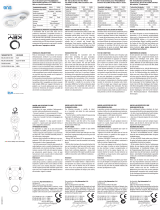 Key Automation 580ISSUB8 Manual de usuario
Key Automation 580ISSUB8 Manual de usuario
-
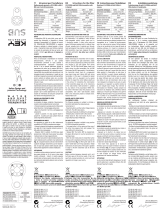 Key Automation 580SUB Manual de usuario
Key Automation 580SUB Manual de usuario
-
Renault Zoe E-Tech 100% Eléctrico Manual de usuario
-
Marmitek LWM1 Manual de usuario
-
DELTA DORE TYDOM 141 El manual del propietario
-
Yokis TLM1t45 Manual de usuario
-
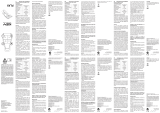 Key Automation 580PLAY Manual de usuario
Key Automation 580PLAY Manual de usuario
-
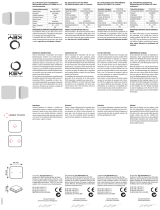 Key Automation 580TOM Manual de usuario
Key Automation 580TOM Manual de usuario


